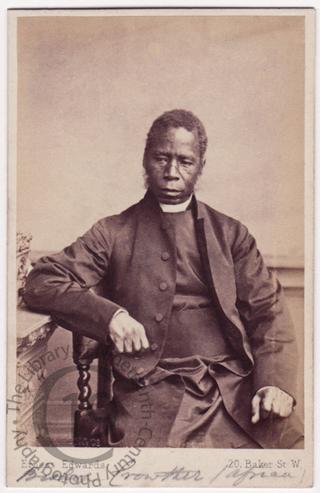
Bishop Samuel Crowther
Born in the Egba group of the Yoruba people in what is now Western Nigeria, his African name was Adjai (properly Ajayi). When he was about 13 he was captured by slave traders, an event he later twice vividly recalled in his writings. He was bought and sold six times before being sold to Portuguese traders for the transatlantic market. In April 1822 the slave ship was intercepted by a British warship and Adjai was taken to Sierra Leone, a colony which had been founded by a coalition of (mainly Christian) anti-slavery interests as a haven from the slave-trade. There he was converted to Christianity and took the name Samuel Crowther. In 1827 he was one of the first students to attend the Church Missionary Society institution at Fourah Bay, where he assisted in the study of African languages, eventually becoming a teacher and evangelist himself.
In 1864 he was appointed as the first African Anglican bishop. His see was ‘the countries of Western Africa beyond the limits of the Queen’s dominions’ and his all-African staff eventually operated over thousands of miles of the Niger territories. However, during the 1880s Crowther’s authority was undermined by a brash new generation of European missionaries who opposed his principals of an indigenous self-governing church and dismissed many of his staff. In 1891 Crowther, by now a broken man, suffered a stroke and died on the last day of the year. A European bishop was appointed to succeed him.
Photographed by Ernest Edwards of London.
Code: 123340




